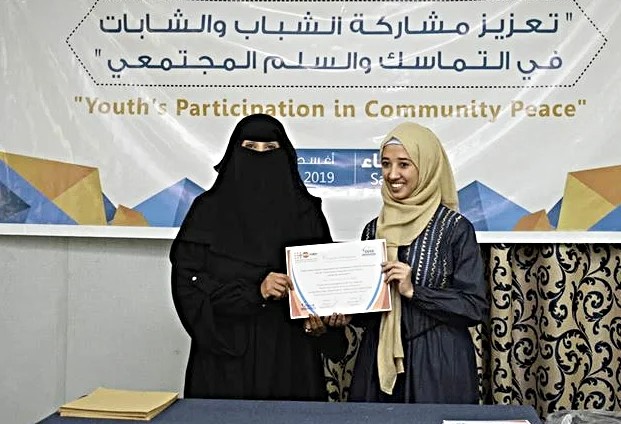Olla Al-Sakkaf (26) started doing social work at the age of 16. Today, she is a programme manager with Youth Without Borders Organization for Development (YWBOD). This is a leading Yemeni civil society organisation and a trusted Cordaid partner. She lives and works in the besieged city of Taiz.
“Being young in Yemen is the worst thing you can imagine. If you’re still alive, you can say you are still alive. That’s about it. We can’t dream of a better future, we only cope with essential needs and the fear of losing someone. We can’t travel, the health system has collapsed, there’s no good education. And the internet, our school and only gate to the world, is really bad. We’re stuck. I have a bachelor’s degree in English literature. I wanted to do a master’s, but the war forced me to give up that dream.”
“By making sure young people can take up their studies, by creating jobs and income opportunities, you are not only helping people now, you are also helping to end the war.”
“COVID-19 has added an extra layer of suffering and fear. It imposed a lockdown in addition to the siege we have been under for several years.”
‘We had nothing, but we did get things going’
“Some of the young men join the war, siding with one of many armed groups. Often, it’s just a way of dealing with extreme poverty. It’s like a job, unfortunately.
Some also organize themselves to alleviate the suffering. I am one of them. Actually, with YWBOD we are doing a lot of things. Mostly, we support rural communities. They suffer most. Together, with the little means we have, we supported schools and hospitals. We do humanitarian work, provide clean drinking water and try to make sure people have enough for basic sanitation and hygiene.”
“We don’t sit back and hope for the best.”
“Nowadays, we get some support from INGOs, like Cordaid. At the beginning of the war, we had nothing. But we did get things going. Groups of young women and men started cleaning neighbourhoods. Others distributed food they had managed to collect themselves, and other items needed for survival. Some youths, like university students, started teaching at schools. Some schools are closed. Or bombed.”
Peacebuilding and security
“A lot of what we do also centers on peacebuilding and security. For example, the Youth Mediation Support Team helps to end the siege imposed on Taiz, our city. We’re not directly involved in the mediations between warring parties, but we do highlight the effects of the siege and the suffering it causes. We communicate about the importance of the mediations. We gather and provide data of people that have been arrested, were taken hostage, or disappeared otherwise in Taiz.

In that way, our advocacy campaigns actively support the mediations. We don’t just sit back and hope for the best.
I am also part of the Youth Peace and Security Pact Yemen. With other young civil society activists, we’re doing all we can to further the peace agenda. This is challenging because those who are in power keep young people largely out of decision-making processes. These are in the hands of politicians. The problem is that politicians are mostly concerned with power and control. Politics should be about governance. And governance’s main task should be to support people and to be responsive to their needs. Whether you’re a civil society activist or a politician, the starting point always has to be helping others.”
Rethinking international support
“It is high time to rethink international support for Yemen. Humanitarian aid is still crucial, but parallel to that, we need to start investing in development. In the future. The rebuilding of Yemen has to start. This rebuilding comes in stages and with priorities. The economy has collapsed. People need jobs and incomes. Young people need to be able to look forward. They have to be able to study, work, and travel. A lot more effort should be put into mediation efforts, locally, such as in Taiz, and nationally. A special UN Envoy will not solve everything. Much more is needed.”
“Donor agencies have to start thinking about Yemen after the war. The social fabric of the country has to be woven anew. This reconstruction has to start now, even though the conflict is ongoing. Because by enhancing trust between wounded communities, by providing long-term psychological support to a scarred generation, by making sure young people can take up their studies, by creating jobs and income opportunities, you are not only helping people now, you are also helping to end the war and to create a better future for the country.”
